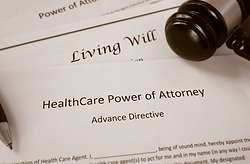What is Estate Planning?
Estate planning is typically thought of as the process of determining how your assets will be managed and distributed after you die, but it is actually much more than that. Estate planning also includes choosing how your assets and income will be managed (and who you trust to manage them) if you experience a life-changing medical event that prevents you from being able to manage them yourself.
Goals
The goal of most individuals is to make things as easy as possible for the people that they leave behind when they pass away, especially their spouses and children. Your estate plan should be one that makes sense for you and your family and brings you a sense of great relief once finalized.
The Culberson Law Office provides a personal touch to your estate plan. From the moment you contact the office, you will be speaking and working directly with Attorney Tracy Culberson. An initial informal meeting is offered at a time that fits your busy schedule, whether during the day, evening, or weekend and in the format of your choosing (in-office, Zoom, or telephone). During the meeting, Attorney Culberson will get to know you and you will get to know him, because it is important that you trust the attorney who will be drafting some of the most important documents of your life. Attorney Culberson takes the time to explain all options when it comes to estate planning from Wills, Powers of Attorney for Healthcare and Finances, and Trusts to ensure that your estate plan is one that achieves your goals and gives you peace of mind.
Options
Last Will and Testament
A last will and testament is a legal document that allows you to state how you want your
assets and property to be distributed after your death. It's your way of specifying who gets
what and how your estate should be handled. You can also use a will to name a guardian for
your minor children, make your funeral and burial wishes known, and choose an executor
(the person who will carry out your wishes). A will gives you control over how your assets
are distributed and ensures that your wishes are carried out and, most importantly, provides
peace of mind for your loved ones by reducing the uncertainty and potential disputes that can arise without it.
Health Care Power of Attorney and Living Will
A health care power of attorney (HCPA), also known as healthcare proxy or durable power of attorney for health
care, is a legal document that allows you to designate someone (your agent or proxy) to make medical decisions for you if you become unable to do so yourself. This can happen due to illness, injury, or incapacity. The agent's authority can vary, but generally includes decisions related to medical treatment, medications, surgery, and where you receive care. The HCPA ensures that your wishes are honored and someone you trust makes decisions about your health care if you can't. The HCPA typically becomes effective when a doctor determines you are no longer able to make decisions for yourself.
Durable Power of Attorney for Finances
A durable power of attorney is a legal document that grants a
designated individual (the agent) the authority to manage your
finances, including paying bills, managing investments, purchasing
or selling your personal property or real estate, and making financial
transactions. It specifies the powers you are granting to your agent,
which can be broad or limited. A well-crafted durable power of attorney ensures your affairs are managed if you become unable to do so yourself, provides comfort knowing your affairs will be handled by a trusted individual, and can be tailored to your specific needs and wishes.
Trusts
A Trust is a legal arrangement where someone (the trustor or grantor) transfers ownership of property to a trustee, who manages it for the benefit of a beneficiary. Trusts provide a way to manage assets, protect them from creditors or lawsuits, and ensure assets are distributed according to the trustor's wishes after their death. The use of a Trust in estate planning is becoming more popular and common for the primary purpose of bypassing the probate administration process, which can oftentimes be a lengthy, costly and frustrating experience. There are pros and cons to Trusts and the Culberson Law Office will work closely with you to help you decide whether the addition of a Trust to your estate plan makes sense for you and your family.
What if You Don't Do Anything?
If you haven't done any estate planning whatsoever, here are some important things to think about. If you don't have a healthcare power of attorney or a durable power of attorney for finances and you become incapacitated, your family will have to petition the probate court to be appointed to serve as your legal guardian. Guardianship can be a difficult and expensive process that involves filing annual reports and accountings with the court. Although the Culberson Law Office specializes in adult guardianships, you should try to avoid one.
If you die without a will, your family may need to open a probate administration. Dying without a will is called "intestate" and your money and property will be distributed according to NH RSA 561:1, which may be completely contrary to what you would have wanted. That child you wanted to disinherit would then be entitled to some, or all, of your estate. Those tools or your beloved car might have to be sold instead of going to a person of your choosing. Plainly put, the law doesn't care what your wishes are if you die intestate.


